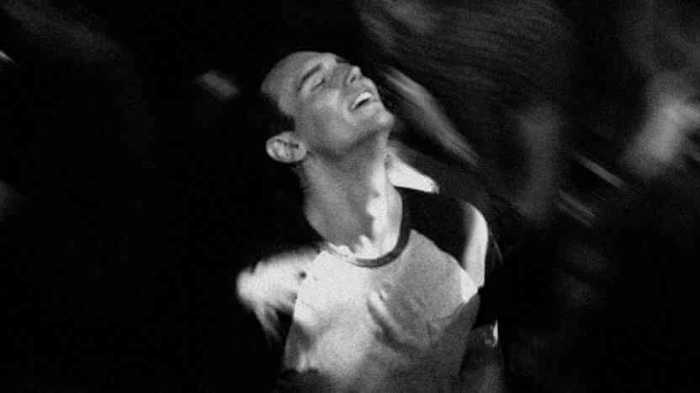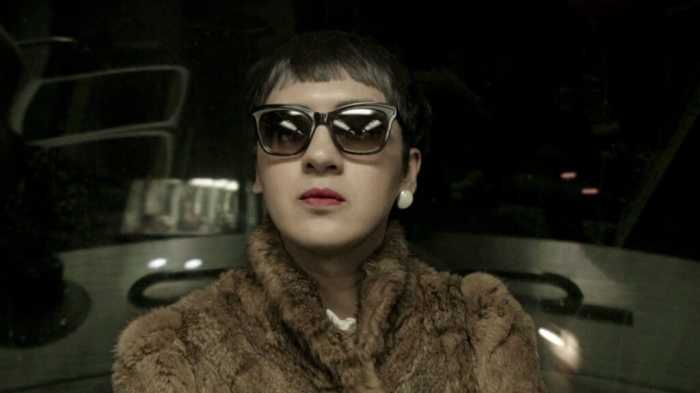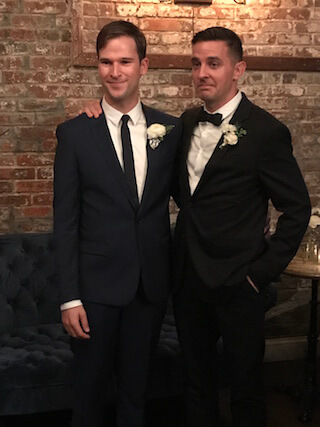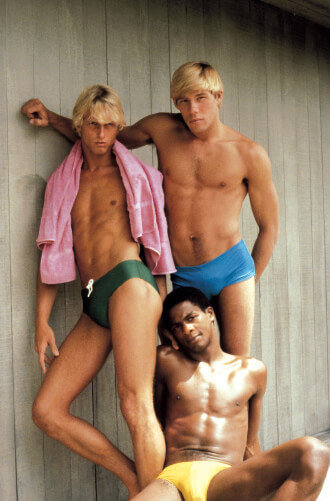Fabio Audi, Ghilherme Lobo, and Tess Amorim in Daniel Ribeiro’s “The Way He Looks.” | NEWFEST
NewFest, the city’s LGBT film festival, runs July 24-29 and showcases New York premieres of many worthwhile LGBT films. In this issue and the next, Gay City News highlights some of the standouts from the schedule of screenings.
On July 24 at 7:30 p.m., out filmmaker Karim Aïnouz will receive the festival’s Achievement Award, followed by a screening of his superb new film, “Futuro Beach.” This stunning drama features a hunky Brazilian lifeguard, Donato (Wagner Moura), bonding — often in a naked, physical sense — with Konrad (Clemens Schick), who is grieving over the loss of his friend. After Donato visits Konrad in Germany, their relationship deepens and changes. Things change even more when Ayrton (Jesuíta Barbosa), Donato’s younger brother, takes over the narrative in the film’s third act.
Aïnouz’s deliberately elliptical style of storytelling captures ebb and flow of its characters’ erotic and emotional currents, which is what makes the film so mesmerizing.
NewFest offerings examine many paths to surprising emotional bonds
Also from Brazil is “The Way He Looks” (July 29, 5 p.m.), Daniel Ribeiro’s expanded version of his excellent 2010 short, “I Don’t Want to Go Back Alone.” This feature is one of those rare cases of improving on the original.
Leonardo (Ghilherme Lobo) is a blind teenager whose BFF, Giovana, or Gi (Tess Amorim), assists him in school and often walks him home. Gabriel (Fabio Audi) joins their class and befriends Leo and Gi, but when a class assignment forces Gabriel and Leo to work together, the guys quickly form an intimate bond — and Gi is soon jealous.
“The Way He Looks” charts the tender sexual tensions and burgeoning desires that develop between the two teenage boys as — no spoiler here — they slowly fall in love. This buoyant film is utterly captivating and easily the feel good film of NewFest. Not to be missed.
Another film featuring teenagers is the made-for-TV Dutch feature “Boys” (July 24, 9:30 p.m.), Mischa Kamp’s sensitive drama that traverses familiar coming out/ coming of age film territory. Sieger (Gijs Blom) runs track and qualifies for a squad with his best friend Stef (Stijn Taverne). Partnered in the relay with Marc (Ko Zandvliet), Sieger is unexpectedly attracted to him, and the two develop a homoerotic bond that becomes more intense as they begin stealing kisses. Sieger fights his romantic feelings with macho posturing and half-hearted dates with Jessica (Lotte Razoux Schultz).
If there are no surprises about whether Sieger and Marc will end up together, “Boys” focuses on framing the conducive mood that makes that possible. Scenes of the teammates shot through a trampoline or sharing a moped ride together depict affectionate moments that speak volumes. If this slight film seems padded out with a subplot involving Sieger’s cute but troubled older brother Eddy (Jonas Smulders), it is forgivable.
Ben Wishaw in Hong Khaou’s “Lilting,” screening July 27. | NEWFEST
Hong Khaou’s “Lilting” (July 27, 7 p.m.) is a subtle chamber drama about the communication gap between Richard (out actor Ben Whishaw) and Junn (Pei-pei Cheng). Both are mourning the loss of Kai (Andrew Leung), Junn’s son and, unbeknownst to her, Richard’s lover. Richard doesn’t speak Mandarin and Junn does not speak English, so Richard hires Vann (Naomi Christie) to help translate and bridge the gulf between them.
“Lilting” is a bit stagy given the construct of Junn and Richard each talking through Kai against the backdrop of the mother imagining her late son and the surviving lover remembering him in flashbacks. Moments where Kai is translating can often having a static feel.
Still, the film deftly addresses the loss both mother and lover suffer. Junn feels lonely and suffocated, while Richard copes with survivor’s guilt while having to navigate the prickly Junn’s jealousy. “Lilting” builds to an emotionally powerful climax, and the performances by Whishaw and Cheng, especially, are very affecting.
A lesbian entry, Daniel Armando’s “What It Was” (July 26, 4 p.m.) is a poetic meditation on longing and desire as Adina (Arlene Chico-Lugo) faces her fears and searches for love and self-worth in New York. The story hopscotches back and forth in time, chronicling her relationships with Toni (Deirdre Herlihy), Hilary (Melissa Navia), and Mondi (Brandon Smalls) — each of whom offers affection but also complications.
The film is beautifully shot, with lovely scenes of Adina in the city — on the subway, crossing bridges, and on the streets. An especially intimate sequence has Hilary painting Adina’s body. If Adina’s poignant voice-overs sometimes risk seeming pretentious, they also contribute to the film’s ephemeral quality.
Bruce LaBruce Finds Something New in Something Old NewFest’s closing night feature, on July 29, is “Gerontophilia” the latest film from Bruce LaBruce. If viewers are expecting a typical radical-pornographic film by the Candian enfant terrible, they will be surprised. “Gerontophila” is a surprisingly sweet film depicting the unexpected love affair between a handsome recent college grad, Lake (Pier-Gabriel Lajoie), and Mr. Peabody (Walter Borden), an 81-year-old patient in an old age home.
Bruce LaBruce spoke with Gay City News about his thoughtful romance as well as about fetishes.
GARY M. KRAMER: Bruce, you made a charming film about a taboo subject. Were you out to shock?
BRUCE LABRUCE: Yes, absolutely! That was the strategy. The idea was to do something shockingly kind and gentle because I’ve done so many shocking and often pornographic films. I wanted to choose a subject that was a transgression of a sexual taboo or treating a fetish romantically, but not to make it explicit this time. I expected more of a resistance, but people don’t seem too pissed off that I’m trying something completely different.
GMK: What is the appeal of this fetish, gerontophilia?
BLB: It’s the reverse “Lolita,” with the old man as the sex object. The closer to death the person is, the more erotically charged it is for the gerontophile. The fetish is coming from a place you can’t define. It is as mysterious for Lake as it is for the audience.
GMK: How do you think your film punctures the taboo of gerontophilia in particular, and fetishes in general?
BLB: I think there is a misconception that fetishes are nasty, or something to be ashamed of. But I’ve found there is often a great appreciation for the object of the fetish — that a foot fetishist appreciates the foot and the form of the foot. There’s an aspect of that here: Lake’s sexual connection to the elderly starts with empathy. All the characters in the film are experimenting and transgressing sexual barriers.
NEWFEST | New York’s LGBT Film Festival | Walter Reade Theater, 165 W. 65th St. | Jul. 24-29 | newfest.org





































